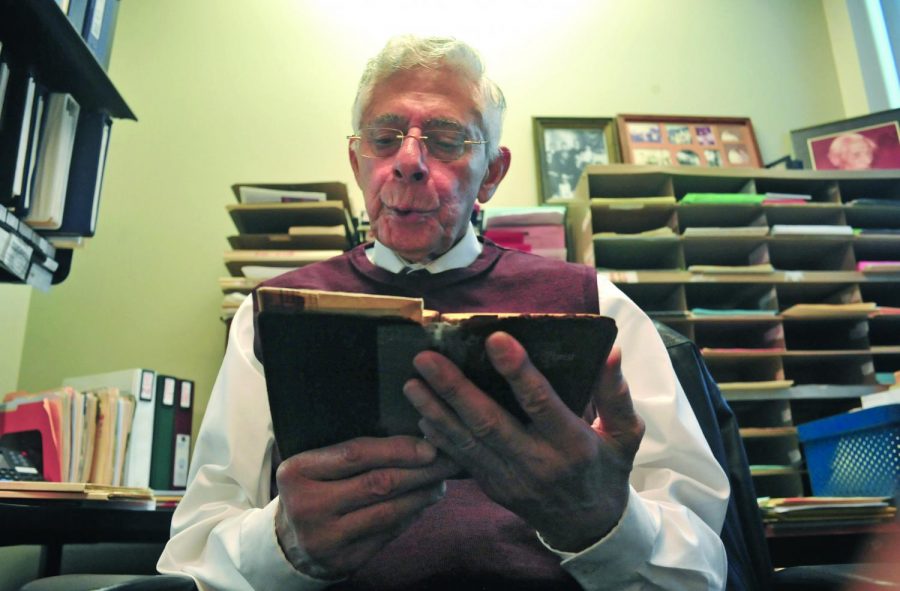Accomplished counselor, teacher holds community history
Cherished momentos gained through decades fuel career longevity
Oct 11, 2017
“I am often asked, ‘What do you tell students?’” Contra Costa College counselor Alfred Zuniga said as he eased back into his chair and began observing the assorted mementos that decorate his office.
“I always say, ‘They tell me.’ And I just sit and listen,” he said with a smile of pure elation.
Dedicating the last 49 years of his life to CCC, the 83-year-old Zuniga has transcended that of a beloved counselor tucked away in the back of the counseling department.
Over the decades he has been pivotal in the lives of students and in shaping the college curriculum.
He has also become a fixture, providing resources and campus history.
As the first proud Chicano hired by the Contra Costa Community College District in August 1969, Zuniga brought to CCC his first-hand experiences of growing up in the barrio.
Born on June 10, 1934 in San Diego, California, Zuniga who was raised in a Catholic household along with his older brother and two younger sisters, was studious from a very young age.
“We lived 17 miles away from the Mexican border,” he said. “I made my first nickel when I was 5 years old — that’s what Mexican kids do.”
After graduating high school in 1952, he began his Jesuit formation, which spiritually and academically prepares candidates for the Roman Catholic Society of Jesus.
“I grew up in a Catholic home and from my mother learned life is about service,” he said. “How can I be of service?”
From 1952 to 1956 Zuniga spent time at Sacred Heart Novitiate in Los Gatos, California, and later three years at Mt. St. Michael’s in Spokane, Washington from 1958 to 1961.
In between these years of study, Zuniga taught history at St. Ignatius High School in San Francisco where he also coached the basketball team and ran track.
He graduated in 1960 with a bachelor of arts degree in theology from Gonzaga University in Spokane.
Zuniga would later receive a master’s in philosophy in 1967 from the University of Santa Clara.
On June 7, 1967 Zuniga was ordained as a Jesuit priest at St. Ignatius Church after seven years of educational study.
“For it to have purpose for me, it has to involve helping other people,” he said.
His cultural background resonated with Mexican-American students who longed for a relatable teacher-counselor who could provide courses and advice during a time of warranted empowerment.
“They wanted someone who grew up in the barrio,” Zuniga said. “It was unusual at that time for someone from the Mexican barrio of San Diego to be educated.”
A full-time teaching position in the CCC counseling department came open and Zuniga applied for it in 1969.
In an Aug. 15, 1969 letter to then CCC President Robert L. Wynn, the Latin American Student Union, whose members were part of the interview committee for the position, recommended Zuniga for the position. He was hired for the job.
Once employed, Zuniga became instrumental in providing courses pertaining to the study of Chicano history.
He implemented the first ever Mexican-American courses, which began in the spring of 1970 and included Politics of the Mexican-American Community and the Psychology of the Mexican-American.
“I’ve known Al (Zuniga) since I was 18,” CCC counselor Norman Valdez-Jimenez said. “As my counselor he helped me apply for scholarships and wrote letters of recommendation. He encouraged me to apply for the Kennedy- King Scholarship and the Hispanic Scholarship Fund, which I (won).”
Valdez-Jimenez said for those who took La Raza 141 or 142, they would remember how Zuniga always brought food to class.
“You’d also remember how many friendships and connections were created in those classes,” she said. “Al has a tremendous heart and he loves and is energized by helping others. His life’s passion is being in service to others.”
After a solid academic year, the Latin American Student Union felt the administration was dismantling the courses Zuniga built.
In September 1970, the La Raza studies program was incorporated into the course catalog after a misunderstanding among Zuniga, the district and the CCC administration. An agreement included discussions involving points that created the foundation of the La Raza program as it is known today.
“Everything I have done is for the department and the impact on the lives of those who it serves,” Zuniga said. “I’ve made an impact in the lives of students, but they don’t know the impact they have made on me.”
Zuniga continued his studies in 1972 receiving a master’s degree in Mexican-American studies from San Jose State University, and later a master’s from Stanford University in 1981.
On and off from 1981 to 1989 he attended San Francisco State University in the Educational Leadership (Ed.D.) Program.
CCC Dean of Equity and Institutional Effectiveness Mayra Padilla said, “When I first met Al (Zuniga) I was 14. He came into Richmond High to talk about the METAS program.
“He has the ability to really touch students and guide them to resources. That’s something that can draw people in,” she said. “The CCC campus would not be what it is today without Al and his dedication to student success.”


